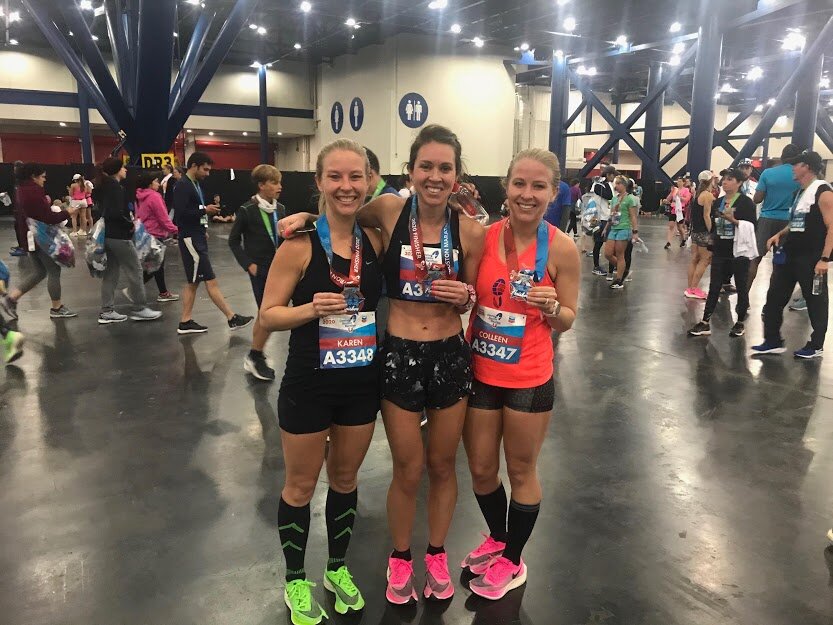Each time my training group encounters wind, snow, ice or hills (read: anything challenging) on our weekly long runs, we joke about how running is a questionable hobby. Sometimes you feel a little nuts fighting the wind running in circles at the track or trying to run marathon pace up any of the unnecessarily large hills at Loch Raven. Fortunately, I've found a crew that seems okay with the crazy. I've been running for more than 12 years now, and training for marathons consistently for the last two and a half (this ages me, but whatever). Every time I start to think I have things figured out, I find myself surprised by this thing that has become far more than a hobby. I recently ran my sixth, and fastest, marathon in Houston this January. I also ran the Marine Corps Marathon in October, which, as any friends reading well know - was a monsoon. I'd like to publicly apologize for the number of times I discussed, in detail, the absolutely horrendous weather at said marathon, but - it really was that bad. I briefly celebrated the moral victory of not calling it quits (Which I contemplated at miles 14, 16, 18, and 20-22, to be specific) as well as placing ninth overall in a pretty large major marathon. Ultimately, though, I knew I'd put too much work into a long summer of training to let that race be the sole outcome.
I've learned a lot about myself and my body through running marathons. The concept of running back-to-back races doesn't align with my usual approach, so I was somewhat hesitant to train for another marathon so quickly. It wasn't until after my coach said he'd help write me a training plan that I signed up for Houston. I'd heard it was flat, fast, and the weather usually wasn't downright offensive. Admittedly, my bar for "decent" weather was pretty low- there wasn't much, if anything at all, that could be worse than what I'd ran through at Marine Corps. I told myself if my body wasn't down with any part of this mini training cycle, I'd shut it down. I knew I wanted to be at the starting line of the Boston marathon in April, no matter what. Spoiler alert: I didn't have to shut it down. I went to Houston a little more than a month ago and ran a 2:54 marathon. I'll save you the blow-by-blow recap, but know that there were big, ugly tears at that finish line. As someone who didn't really know what a BQ was until 2017, I never dreamed I'd be fortunate enough to be where I am now. I certainly never thought I'd have found something that, despite being purely a hobby, has such a profound place in my 31-year-old life. Here are 7 (10 was too conventional) things I learned this Fall.
1. Run with people
I used to only ever run solo. A few years ago, I never would have considered joining a training group or even asking someone to meet up for a run. I described in a previous blog post that it was my Mom who actually suggested I check out the training groups at Charm City Run. I don't know what made me actually listen to her (sorry, Mom), but I'm grateful I did. Now, I can't imagine running 20 miles in the rain alone. Or doing 12 x 400 meters at the track without someone to grab water with mid-workout. Sure, from time to time it's really nice to throw on a podcast and go out for an easy run alone. But usually, it's simply more fun with friends. A lot of the people I've met through my training group started out as "running friends" and have become real, actual friends. When you run with someone for 20 miles, turns out you get to know them pretty well. No topic is off limits, no matter how weird (Bathroom habits comes to mind). These are people that embrace limited sleep, a good beer in the parking lot post long-run, and way too much discussion about what's on our feet (The new New Balance 1080 really is that good). Peter Bromka, a writer and runner for Nike, is one of my favorite people to follow for racing and running insights. In a recent podcast, he noted that running needs to be bigger than the individual, that it has to be about more than your personal accomplishments. The community I've found has been the single most positive contributor to both my relationship with running and my overall improvement over the last couple of years. If you're nervous to show up to a training group, consider that everyone in the group was new at some point. Trying something outside your comfort zone can be really tough - but you never know when it might rock your world in the best way possible.
2. Run with people faster than you are (See #1).
To get faster, you need to run faster (Also significantly slower on your easy runs, but that's a different story for a different day). One of the best things I've done is try to keep up with people in my training group that run at paces that are above what feels comfortable for me. Some of my best workouts have been long runs that I've done with friends that I've always considered "too fast" (Ahem, Jeff, Jaci, Tyler, Matt...). I've started out the run with them, and set my mind to running with them as long as I could. The days where I've made the mental commitment to sticking with a slightly faster crew (e.g., "I won't let myself get dropped in this workout") have been the days that I've hung on and seen some pretty cool things happen.
3. Cross training is your friend.
I know this may be an unpopular opinion, but there's some serious benefit to mixing it up. I had some pretty serious nerve pain a couple of years ago that put me out of running for a while, forcing me to get back into old hobbies (swimming) and try out some new ones (yoga, spinning). I really believe you can learn a lot from challenging situations, and this was no different. I came out of the injury a better, more open-minded person. I learned that for my body, I needed to add in strength training and mobility exercises to make sure I was engaging the appropriate muscles while running. I learned that for my body, I needed a cross training day (or two) a week to keep my muscles happy. I learned that for my body, the quality of the miles was more important than the quantity. I also learned that despite logging lower mileage than some of my peers, I could still get faster. I'll spare you all the links to articles that support the use of cross training for runners, but, the bottom line? Don't be afraid to trade an easy run for a spin class, yoga, or pool workout. Your stabilizer muscles will thank you for the tune-up, and your legs will thank you for the brief relief from the pounding of marathon training. And, hey, you might find a fun new hobby in the process.
4. Stop comparing.
I know, I know. Easier said than done. I still struggle with this one, but it's something I've worked pretty hard on. I can't tell you the number of times I've opened Strava with plans to take a cross training day and seen that a friend has done a quick 10-miler. I'll refrain from getting on my soapbox of setting personal limits related to the amount of time you spend on social media (do it!). But, I'm not too proud to say that after seeing friends' runs, I'll second-guess my choice to cross train, thinking that I should do a 10-miler, too. Ultimately, social media can make it feel like everyone is doing more, running faster, or taking fewer days off. But the reality is - we're all different. There's no one "right" way to train - in fact, there are a lot of different paths to the same result of getting faster or running father. I'm a nurse in the pediatric ICU, and spend a lot of time each week in the hospital. I go to work in the dark and leave in the dark (Summer, where are you?). I catch myself wishing I could run higher mileage, or had more time during the week to run outside in the daylight, or wasn't so tired all the time after work. But the reality is, anyone that puts in the work to move their body in a consistent way is accomplishing something pretty awesome. Last night, I was on the treadmill at 9pm, finishing a 7-mile easy run. As I shut the treadmill down and gathered up my things, I paused. I felt gratitude for the fact that I was able to get myself on the treadmill after 13 hours of work. The miles weren't especially fast or especially easy, but I did it. Take a minute every few days to appreciate your body for everything it can do and does do for you on a regular basis.
5. Consider breaking up with your watch (even just for a little).
It's 2020. We have endless options for watches, fitness apps, headphones, and even running shoes that connect to all of these devices. In the past, I've definitely been pretty bad at using my Garmin effectively during races. I've tried taking manual splits at each mile, which is so hard to remember to do. I've tried using auto-lap, only to have the pace impacted by tall buildings, the weather, and who knows what else. I've even accidentally left the auto lap on and ALSO tried to take manual splits. I especially don't recommend this option. My coach, Jeff, mentioned that he turned off his auto lap at CIM in favor of using the the clocks on the course and the running time on his watch. As soon as I saw Houston had clocks at every mile, I knew this was my best bet. I think as runners it's really easy to become watch-dependent. Sometimes the watch can help us wrap our brain around what a specific pace feels like - especially when it's something more challenging than what we've done previously. However, by the time you get to your goal race, your body usually has a pretty good idea of what your goal pace feels like. Turns out, not having to look down at your watch every mile when it goes off is pretty freeing - it allows the miles to tick by relatively quickly and doesn't allow for any anxiety to creep in if a mile is a few seconds slower or faster than what it "should" be. For your next race, consider running watchless or, if that sounds too scary, turning off your auto-lap and see how it goes!
6. Sometimes, it pays to go for it.
Because I didn't pay quite enough attention to the course clocks, I ended up running the first 15 miles of Houston with a gentleman who I found out around mile 15 was shooting for just under 2:50. Admittedly, it can be hard to know if you've gone out too fast or too slow in a race without some help from technology (turns out mental math is a hard during the marathon). This pace was a bit of a stretch (LOL) from what I'd trained for, but I figured I'd hung in there as long as I had - why not try and keep up. It turns out I ran pretty fearlessly from the start of the race, and was able to hang on pretty well. If I hadn't gone out just a little faster than what was comfortable, I would never have really known my limits. Now, I'm not suggesting to go out at something unrealistically fast - as in, I didn't run with the pack of women trying to qualify for the Olympic Trials. But just as in training sometimes it helps to go outside your comfort zone with faster friends, there's no harm in applying the same mentality to a race to see what happens. As I like to say, positive splits for positive people!
7. Running should be fun.
Part of the reason I think I had such a good race has to do with the fact that I had a really great time. I usually feel a degree of stress with goal races, which I'd say is normal because it's something that matters to me. This time, I decided to try and let go of the stress as much as possible. I tried not to look at the weather (and failed, but it's the attempt that matters), got to Houston a day early to relax, booked a hotel near the starting line, visited with good family friends in Houston, ate great local food, took goofy pictures and videos at the expo, and most importantly, spent a ton of time with my mom. I talked to people in the corrals, listened to great music, high fived the kids in Lamar Jackson jerseys at mile 8, and tried not to stress when I flung a full Gu packet behind me trying to open it at mile 16. My mom and her friend, Robin, made it out to three different spots on the (very spread out) course to cheer Afterwards, I hung out with two friends (who also had killer races) and their amazing family at a beer garden. Running is supposed to be fun. No one's paying us to do this (unless you're Desi or Shalane), so it generally should feel like a positive, rewarding use of your time. Now, don't get me wrong, I'm not saying every run will be sunshine and rainbows (I'm looking at you 2 by 6 mile marathon pace long run). But generally, if there's not some underlying joy in your running, consider if you need a break or just a mental reset. There's no harm in cross training for a little to give your body and mind a break from the run (See #4). I left Houston feeling grateful. I was filled with gratitude that my body gave me another opportunity to race after running a marathon just a few months before. I was filled with gratitude that I had such good people in my life. And truly, I'd had a really good time.
- Caryn Just, Timonium Team Member, Boston Training Group Runner and 2:54 Marathoner




